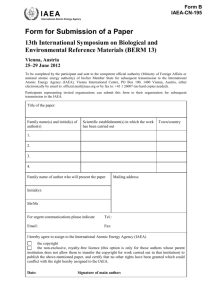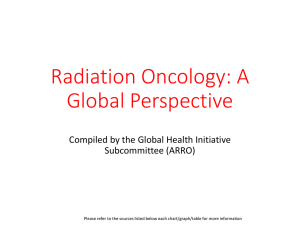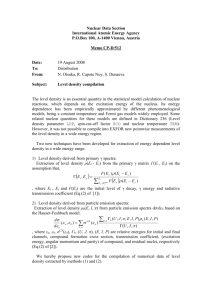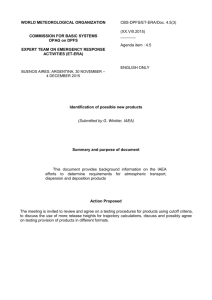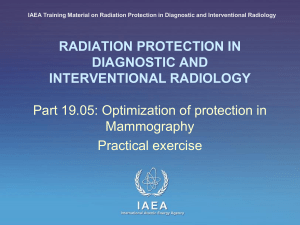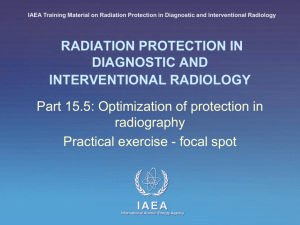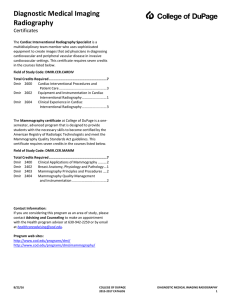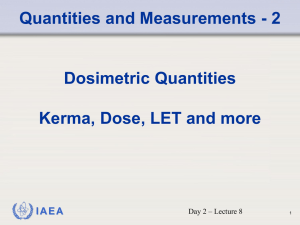International Atomic Energy Agency Technical Cooperation Project
advertisement
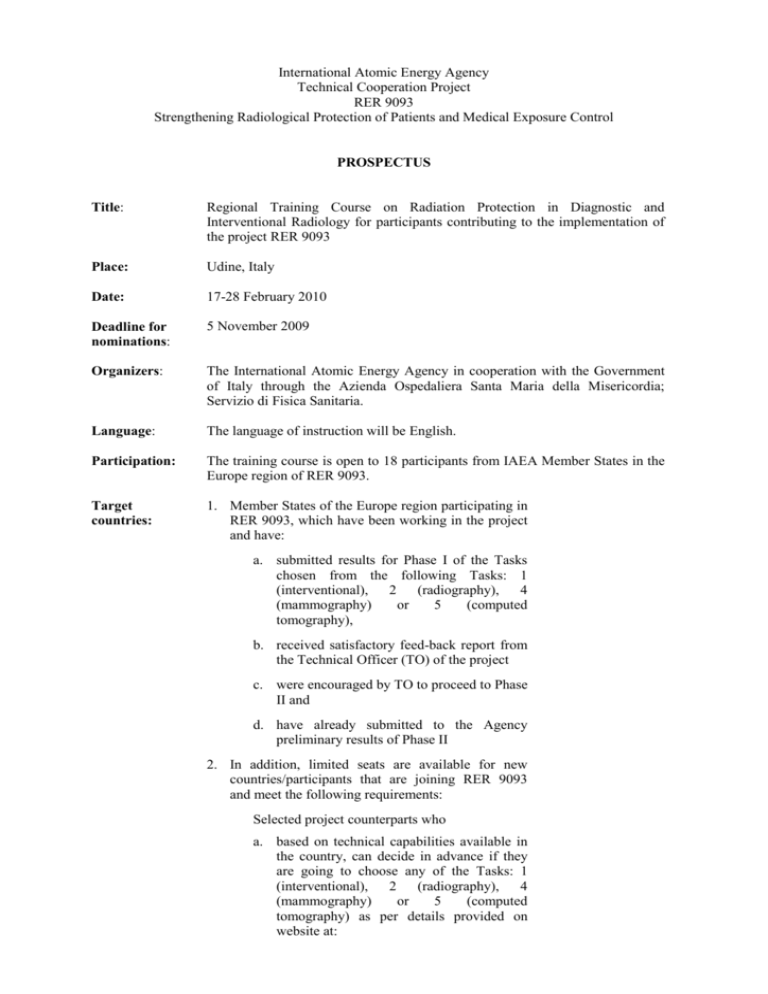
International Atomic Energy Agency Technical Cooperation Project RER 9093 Strengthening Radiological Protection of Patients and Medical Exposure Control PROSPECTUS Title: Regional Training Course on Radiation Protection in Diagnostic and Interventional Radiology for participants contributing to the implementation of the project RER 9093 Place: Udine, Italy Date: 17-28 February 2010 Deadline for nominations: 5 November 2009 Organizers: The International Atomic Energy Agency in cooperation with the Government of Italy through the Azienda Ospedaliera Santa Maria della Misericordia; Servizio di Fisica Sanitaria. Language: The language of instruction will be English. Participation: The training course is open to 18 participants from IAEA Member States in the Europe region of RER 9093. Target countries: 1. Member States of the Europe region participating in RER 9093, which have been working in the project and have: a. submitted results for Phase I of the Tasks chosen from the following Tasks: 1 (interventional), 2 (radiography), 4 (mammography) or 5 (computed tomography), b. received satisfactory feed-back report from the Technical Officer (TO) of the project c. were encouraged by TO to proceed to Phase II and d. have already submitted to the Agency preliminary results of Phase II 2. In addition, limited seats are available for new countries/participants that are joining RER 9093 and meet the following requirements: Selected project counterparts who a. based on technical capabilities available in the country, can decide in advance if they are going to choose any of the Tasks: 1 (interventional), 2 (radiography), 4 (mammography) or 5 (computed tomography) as per details provided on website at: http://rpop.iaea.org/RPoP/RPoP/Content/Inf ormationFor/MemberStates/1_RegionalProj ects/index.htm b. can nominate a person responsible for patient dose estimations and who need training on “how to perform dose measurements in these Tasks”. In view of the nature of entrance air kerma measurements, calculation of patient doses and calibration issues, the person should be a medical physicist, preferably working in diagnostic radiology Purpose of the course: The purpose of the training course is to provide practical training on how to estimate and manage patient doses in different imaging modalities like radiography, computed tomography, mammography and interventional procedures. Background Many participants in the regional project RER 9093 have completed Phase I of the Tasks chosen in the regional coordination meetings held in 2007 and 2008. For going to Phase II, the need has been felt for practical training on “how to make measurements of air kerma or CTDI and how to estimate patient doses” in different imaging modalities. In view of highly technical nature of the patient dosimetry work, it was emphasized in the last regional coordination meeting held in Vienna in December 2008 that further practical training should be arranged based on the experience gained in Udine training courses held in 2007 and 2008. In order to meet this need, it is proposed to support training in a Hospital in Udine, Italy on 17-28 February 2010 for a limited number of participants. Participants’ qualifications and experience: In view of the nature of entrance air kerma measurements, calculation of patient doses and calibration issues, the person should be a medical physicist, with working experience in radiology. He/she should already have been involved in data collection and analysis for any of the Tasks 1, 2, 4 and 5. Strong justification is needed if the medical physicist does not have working experience in radiology. As the training course will be conducted in English, participants should have sufficient proficiency to follow lectures and express themselves in this language without difficulty. Nature of the course: Application procedure: The training course is dominated by practical sessions in radiography, CT, interventional and mammography rooms. There will be supporting lectures on “Why, what and how” about patient dosimetry. Nominations should be submitted on the standard IAEA application form for training courses. Completed forms should be endorsed by and returned through the established official channels (the Ministry of Foreign Affairs, the National Atomic Energy Authority or the office of the United Nations Development Programme). They must be received by the International Atomic Energy Agency, P.O. Box 100, A-1400, Vienna, not later than 5 November 2009. Nominations received after that date or applications which have not been routed through one of the aforementioned channels cannot be considered. Advance nominations by facsimile (+43-1-26007) or e-mail (Official.Mail@iaea.org) are welcomed. The facsimile/e-mail should contain the following basic information about the candidate(s): name, age, sex, academic qualifications, present position including exact nature of duties carried out, proficiency in English, and full working address (including telephone and fax numbers and e-mail) to enable the IAEA to make preliminary evaluation of the candidates. Administrative and financial arrangements: Nominating Governments will be informed in due course of the names of the selected candidates and will at that time be given full details on the procedures to be followed with regard to administrative and financial matters. During their attendance at the course, participants from countries eligible to receive technical assistance will be provided by the IAEA with a stipend sufficient to cover the cost of their accommodation, food, and minor incidental expenses. The IAEA will also provide the participants with a round-trip air ticket, economy/excursion class, from their home countries to Udine, Italy and return. Shipment of accumulated course materials to the participants’ home countries is not the responsibility of the IAEA. The organizers of the course do not accept liability for the payment of any cost or compensation that may arise from damage to or loss of personal property, or from illness, injury, disability or death of a participant while he/she is traveling to and from or attending the course, and it is clearly understood that each Government, in nominating participants, undertakes responsibility for such coverage. Governments would be well advised to take out insurance against these risks.
